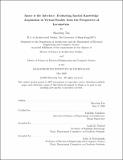Space is the interface : evaluating spatial knowledge acquisition in virtual reality from the perspective of locomotion
Author(s)
Tan, Shaoying,S. M.Massachusetts Institute of Technology.
Download1193319765-MIT.pdf (12.16Mb)
Alternative title
Evaluating spatial knowledge acquisition in virtual reality from the perspective of locomotion
Other Contributors
Massachusetts Institute of Technology. Department of Architecture.
Massachusetts Institute of Technology. Department of Electrical Engineering and Computer Science.
Advisor
Takehiko Nagakura.
Terms of use
Metadata
Show full item recordAbstract
Humans acquire spatial knowledge through sensory integration, which comes from constant interaction with the environment. Locomotion, one of the earliest behaviors developed by infants, are the foundation of many such complex interactions. Similar to what we experience in the physical world, the way we interact with the virtual space plays a crucial role in how we receive the spatial information delivered. In this thesis, I conduct an experimental study on the influence of locomotion interfaces, i.e., motion-based locomotion, joystick-based locomotion, and teleportation on information-in-context virtual reality experience and acquisition of spatial knowledge. Then through the analysis of experiment results and case studies, I propose a framework for designing a suitable locomotion interface for different virtual experiences. In order to study and reveal the impact of different locomotion technologies, the research project includes a series of experiments in virtual rooms. Different tasks will be developed from three different objectives, to study the following three types of experience in virtual reality: the city wanderer, the book seeker, and the bus traveler. The results of the experiments are used to analyze the effectiveness of the locomotion interfaces, on user's acquisition of spatial knowledge the virtual environment intended to convey. Based on the analysis, primary guidelines are derived as a design framework for virtual reality locomotion interface, and applied in case-studies on projects from the MIT Design Heritage Catalogue. The case studies, serving as more complex real-world application scenarios, involves virtual environments of distinct scale and style. The result of this research suggests that the virtual reality locomotion interface has a substantial impact on the kind of spatial experience the users gain, and considerations to its design should be carefully made according to the spatial context and user persona set for the project.
Description
Thesis: S.M., Massachusetts Institute of Technology, Department of Architecture, May, 2020 Thesis: S.M., Massachusetts Institute of Technology, Department of Electrical Engineering and Computer Science, May, 2020 Cataloged from the official PDF of thesis. Includes bibliographical references (pages 72-74).
Date issued
2020Department
Massachusetts Institute of Technology. Department of Architecture; Massachusetts Institute of Technology. Department of Electrical Engineering and Computer SciencePublisher
Massachusetts Institute of Technology
Keywords
Architecture., Electrical Engineering and Computer Science.